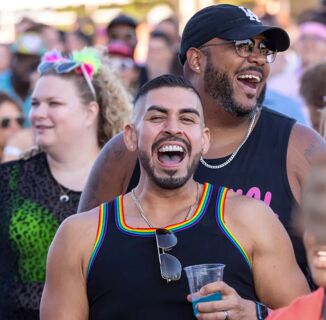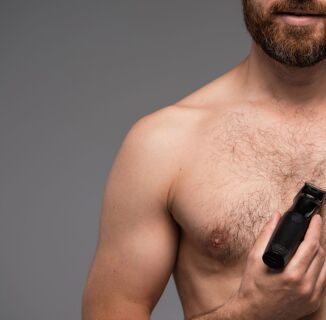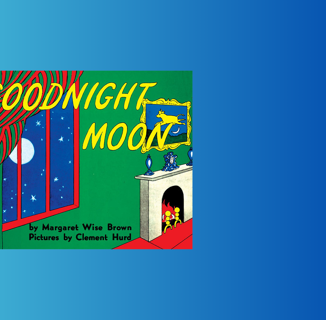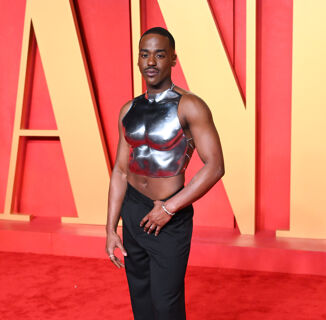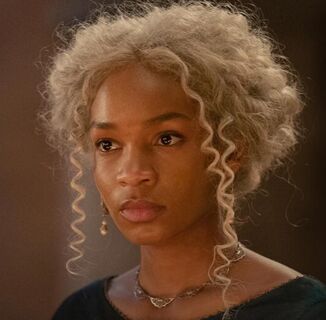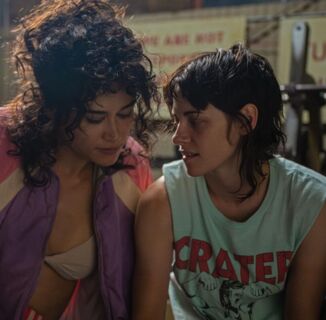T Cooper is the author of seven novels, including the best-selling The Beaufort Diaries and Lipshitz Six, or Two Angry Blondes, as well as co-author (with Allison Glock-Cooper) of the four-part young adult novel series Changers. He recently wrapped his first feature-length documentary Man Made, which is currently playing film festivals.
Man Made follows the lives of four trans men preparing to step on stage at Trans FitCon, the world’s only all transgender bodybuilding competition. The documentary takes us into the heart of the trans male experience via these four men at very different stages of life and transition.
As T prepares for his upcoming California screenings of the film at SF’s Frameline Film Festival and L.A.’s Outfest, we caught up with the writer-turned-filmmaker to talk about everything from representation to storytelling to body image.
What inspired you to make the film Man Made?
The usual—fame and fortune. Because everybody knows the path to both lies in indie documentary filmmaking. No, when I first heard about the all-trans bodybuilding competition about four years ago, I was fascinated with the prospect of trans men competing in the sport, since that’s kind of what we all do anyway, build the bodies and lives that we want, but may not have necessarily started out with. As a writer, my first impulse was to pitch and write a nonfiction piece about the competition, and I found some interested magazine editors with whom I’d worked before, but when I started doing advance research and talking to some of the competitors and hearing their different reasons for participating, as well as their different paths that got them there, it became abundantly clear that this needed to be more three-dimensional than a print story would allow. Essentially, the subject matter—and the subjects themselves—dictated the medium, which is something I think all stories do if you listen hard enough: tell you what they should be and how to tell them.
So I found a producing partner (Roadside Entertainment) who helped me pull a small crew together to shoot the first competition you see in the film. When I saw those guys stepping on stage for that one shining moment in the spotlight, with all different shapes and sizes and experiences and versions of masculinity—and transmasculinity—being represented and celebrated on one platform, that was the “Aha” moment, as in, I was going to find a way to make a film about these guys’ lives, come hell or high water.
Why did you feel it was important to tell this story?
Once I started to hear their stories, and later see the footage from that first competition, it solidified for me that beyond just being a compelling story, it was important at this particular cultural moment to explore our incredibly rich and varied trans male lives that I, as a trans man, don’t necessarily see out there being told very often—and more importantly, in much depth (at least in film and TV). For a variety of reasons, it seems as a culture we are more concerned with stories about trans people who “give up” maleness (and thus the power associated with it), as opposed to stories about those who take masculinity on, so to speak. And since we’re still so profoundly steeped in sexism and misogyny, I think most people, and I’m talking generally here, don’t want to see or think about people assigned female at birth becoming men, because it’s a threatening concept that the whole premise of masculinity (and the power associated with it) is accessible to those thought to be “women.”
Beyond that, I simply wanted to tell authentic stories about diverse trans lives from the inside looking out, as opposed to from the outside looking in, as so much storytelling about trans lives tends to be. Which can have the effect of constantly “othering” or fetishizing trans people, even while attempting to build understanding or compassion for them. I’m not a bodybuilder, but in some ways, this is my story, too, and I was going to take as much care and concern telling it as though it were my own.
What struggles are specific to trans male bodybuilders that their cis male counterparts do not face?
In all-trans bodybuilding, like the central competition featured in the film, I think it’s an entirely unique set of circumstances, as these guys are competing only with other guys who are coming along similar paths (namely, being in bodies that were assigned female at birth). But with respect to the guys in the film who also compete in cisgender, or mainstream, bodybuilding, there’s a whole slew of stuff going on that their competition doesn’t have to think about. Namely, trans bodybuilders haven’t been “on testosterone” as long as cis male bodybuilders, who have been “on testosterone” and developing their male physiques since, presumably, puberty. All of the trans male bodybuilders I’ve encountered and gotten to know didn’t start transitioning until later in life, meaning well after puberty, sometimes in their late 20s or 30s, so they are playing a good deal of catch up to get their bodies competition-ready with respect to cis males.
And further, there is the misconception that trans bodybuilders are “doping” and have some sort of advantage. Which is preposterous considering, for instance, a guy like Mason (a subject in the film), who like most trans men who pursue hormone replacement therapy, takes only enough testosterone to get his T-levels up within the typical range of cis male T-levels. So when Mason competes in cis competition, as you see in the film, he’s at a distinct disadvantage compared to the other Bantamweights in his class. And yet he does compete, and sometimes he even wins, though he must work harder to do it. I think there’s also some psychological stuff at play. In the film, Mason was in a competition where nobody there (besides me) knew he was trans, and there’s definitely that constant itch in the back of your mind that some people would freak the fuck out if they knew that they were competing against a transgender man. (In fact, in the course of filming, Mason was kicked out of a competition when the promoter found out he was trans, so I know that’s got to be going on in the background a lot of the time for him and other trans bodybuilders who enter mainstream competition.)
Why do you think it is important for trans people to be behind the lens when making a film about trans people?
It’s essential that trans people get to tell trans stories so that those stories are not exoticizing or “othering” in ways that, unfortunately, a lot of trans storytelling not made by trans people has traditionally been. I think that’s slowly starting to change somewhat, but there just shouldn’t be the “one” trans story that, say, a network buys and airs, or a (mainstream) film festival programs, for instance. There is no limit on the number of straight, white male stories that are greenlit and elevated and taken seriously as “art,” so why should there be for any other so-called demographic? And I’m not suggesting cis people shouldn’t ever tell trans stories, just that cis creators have traditionally tended to focus excessively (sometimes exclusively) on the physical details of gender and transition (surgery, hormones, penises, etc), which, as I said, becomes fetishizing and othering, and ends up feeling sort of creepy to me and a lot of trans people who see those stories and feel like, “But wait, what is or isn’t between my legs or on my chest is not the sum of my life.” I mean, I can’t even believe we still have to say it, but giving us the tools to tell our own stories and then elevating those stories to a level on par with “normal” stories is far overdue–and now’s the time.
What was the biggest surprise during filming?
I was constantly surprised by the ever-deepening intimacy that I experienced in the subjects’ lives. I mean, I never pushed them or asked to be present for things that they didn’t want me to see, but in the end, it seems I was granted access to pretty much all parts of their lives during the time we spent together, and I think that was precisely because of my being a trans man, too. There was a mutual trust, respect and understanding that immediately took root, and then seemed to grow over the two-years of filming. There were so many times I’d be shooting and be like, “I can’t believe I’m filming this right now,” in the back of my mind, even as I was trying to shoot and produce and direct (and do audio, lighting, etc) all at once. But all of my subjects could tell in the moment that I was treating the stories of their lives like I would treat my own, so there was no way that I would ever use that intimacy against them.
What was the most eye-opening part of making this film?
These revelations were mostly on the filmmaking side. This was my first feature-length film, and I hadn’t filmed a ton before, but I personally shot about 80-85% of it, so just on the technical level, there was a steep learning curve pretty much every single day, from pre-production, to production, to post-production. Making this film was one of the top two hardest things I’ve done professionally (the other being writing my second novel), and I have a profound respect for anybody who makes and actually finishes a feature film independently (i.e. without studio support and financing). Not to sound dramatic, but it’s kind of like marching into the forest, and the thicket just gets more and more tangled the deeper you go, and there are no maps or breadcrumbs, no going back, and light doesn’t get in (as in the edit suite), and it seems like you will never be able to finish, and why should you anyway? But suddenly a little twinkle of light appears, and you go toward it, and all these amazing people are working just as hard and giving their amazing energy to the project, and then it starts to feel like it maybe could be a thing if you put another six months of editing into it.
How has the film been received?
It’s still early on, but I believe pretty well. We won the Best Documentary Jury Prize at the Atlanta Film Festival (where we premiered), and also a Best Doc prize at an all-trans festival (Translations Seattle), so I’m psyched that audiences all along the spectrum of familiarity with trans lives, from mainstream, to cis-het, to LGBT, to all-trans audiences have been moved by it. I’ve shown it to a room full of 100 trans men, which let me tell you, was harrowing at first; I mean, showing this thing about our community who doesn’t feel completely seen, you tend to worry that folks are going to need this film to represent and do way more than it could ever possibly achieve in 90 short minutes. But it was so heartening to hear from so many of them afterwards that they were in tears, or laughing hysterically–and mainly, most poignantly to me, that they’ve never before seen themselves and their lives on screen, and that they were fortified to finally see not only a film exclusively about trans men, but also a film about trans men that isn’t focused on transition or surgery or how much the trans person taxes their family and friends. Not saying there isn’t struggle in Man Made, just that you’re going to also see other aspects of a person’s life, which is always multi-faceted, regardless of identity.
Did making this movie change your relationship to your own body or maleness?
I think as a trans man who is so far beyond transition, so to speak, I forget sometimes what it was like 10, 15, even 20 years ago as a young trans guy trying to figure out what I was, and how I was going to go about achieving it. As you know, these are different times, and when we were coming up as trans men, there wasn’t an internet or access to an enormous community of people who were going through similar experiences. There were obscure German books. In libraries. Or if you could afford them, in bookstores. And there was the one trans guy in NYC I met who had been on hormones and had top surgery and like, blew my mind because I didn’t know that that was even possible for someone like me. So it was actually fortifying to me in some ways to re-experience these seminal moments (in especially the younger guys’ lives as I was filming/following them), and reflect on my past and my path to my own maleness, to see that even though I didn’t have, say, a supportive doctor or access to an online community where I could view thousands of photos of chest surgeries before finding a way to get one myself–I was going to become who I was going to become, no matter what the external circumstances of my generation, if that makes sense. Also: I do 40 pushups every day now.
Man Made will play at Frameline Film Festival on June 16 and June 21 and at Outfest on July 21.
Help make sure LGBTQ+ stories are being told...
We can't rely on mainstream media to tell our stories. That's why we don't lock our articles behind a paywall. Will you support our mission with a contribution today?
Cancel anytime · Proudly LGBTQ+ owned and operated
Read More in Culture
The Latest on INTO
Subscribe to get a twice-weekly dose of queer news, updates, and insights from the INTO team.
in Your Inbox


